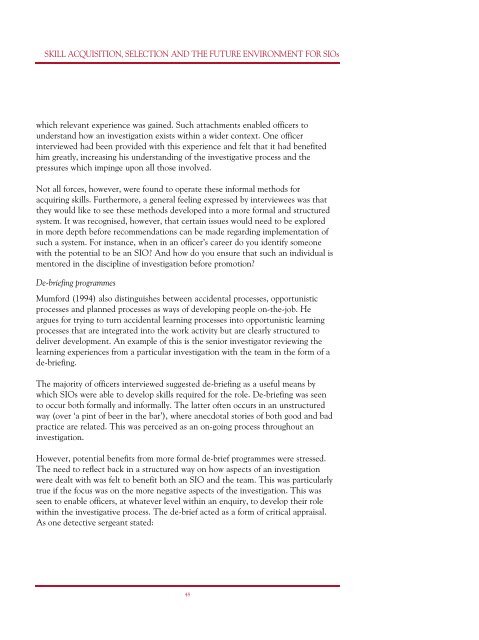Effective Detective
Effective Detective
Effective Detective
- No tags were found...
Create successful ePaper yourself
Turn your PDF publications into a flip-book with our unique Google optimized e-Paper software.
SKILL AC Q U I S I T I O N, SELECTION AND THE FUTURE ENVIRONMENT FOR SIOswhich relevant experience was gained. Such attachments enabled officers tounderstand how an investigation exists within a wider context. One officerinterviewed had been provided with this experience and felt that it had benefitedhim greatly, increasing his understanding of the investigative process and thepressures which impinge upon all those involved.Not all forces, however, were found to operate these informal methods foracquiring skills. Furthermore, a general feeling expressed by interviewees was thatthey would like to see these methods developed into a more formal and structuredsystem. It was recognised, however, that certain issues would need to be exploredin more depth before recommendations can be made regarding implementation ofsuch a system. For instance, when in an officer’s career do you identify someonewith the potential to be an SIO? And how do you ensure that such an individual ismentored in the discipline of investigation before promotion?De-briefing programmesMumford (1994) also distinguishes between accidental processes, opportunisticprocesses and planned processes as ways of developing people on-the-job. Heargues for trying to turn accidental learning processes into opportunistic learningprocesses that are integrated into the work activity but are clearly structured todeliver development. An example of this is the senior investigator reviewing thelearning experiences from a particular investigation with the team in the form of ade-briefing.The majority of officers interviewed suggested de-briefing as a useful means bywhich SIOs were able to develop skills required for the role. De-briefing was seento occur both formally and informally. The latter often occurs in an unstructuredway (over ‘a pint of beer in the bar’), where anecdotal stories of both good and badpractice are related. This was perceived as an on-going process throughout aninvestigation.However, potential benefits from more formal de-brief programmes were stressed.The need to reflect back in a structured way on how aspects of an investigationwere dealt with was felt to benefit both an SIO and the team. This was particularlytrue if the focus was on the more negative aspects of the investigation. This wasseen to enable officers, at whatever level within an enquiry, to develop their rolewithin the investigative process. The de-brief acted as a form of critical appraisal.As one detective sergeant stated:48


